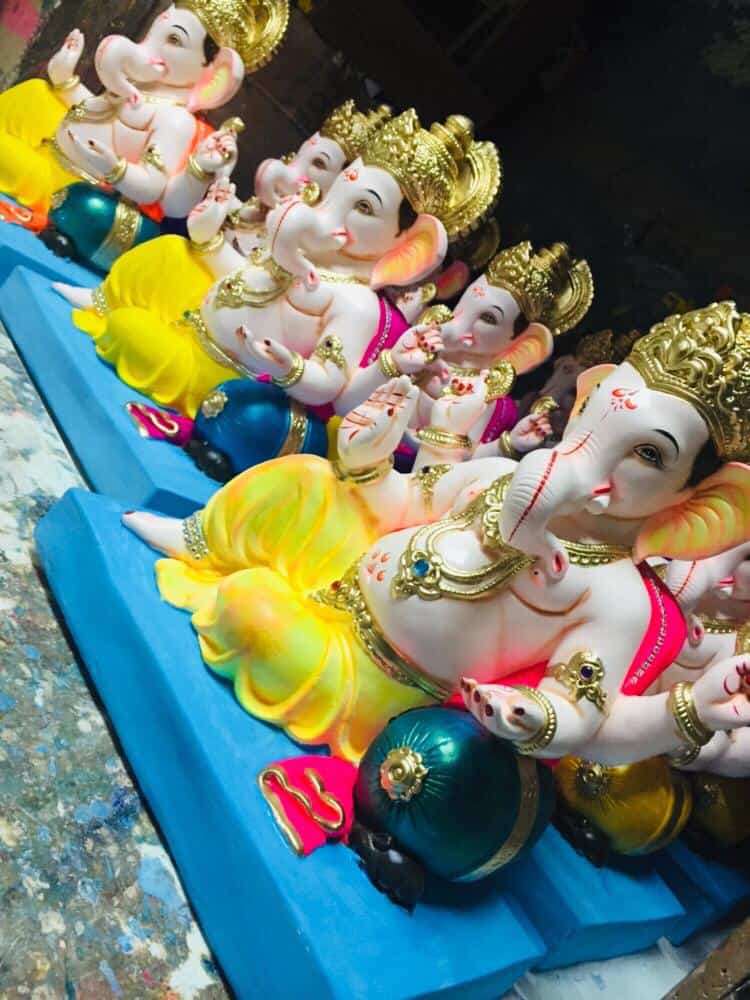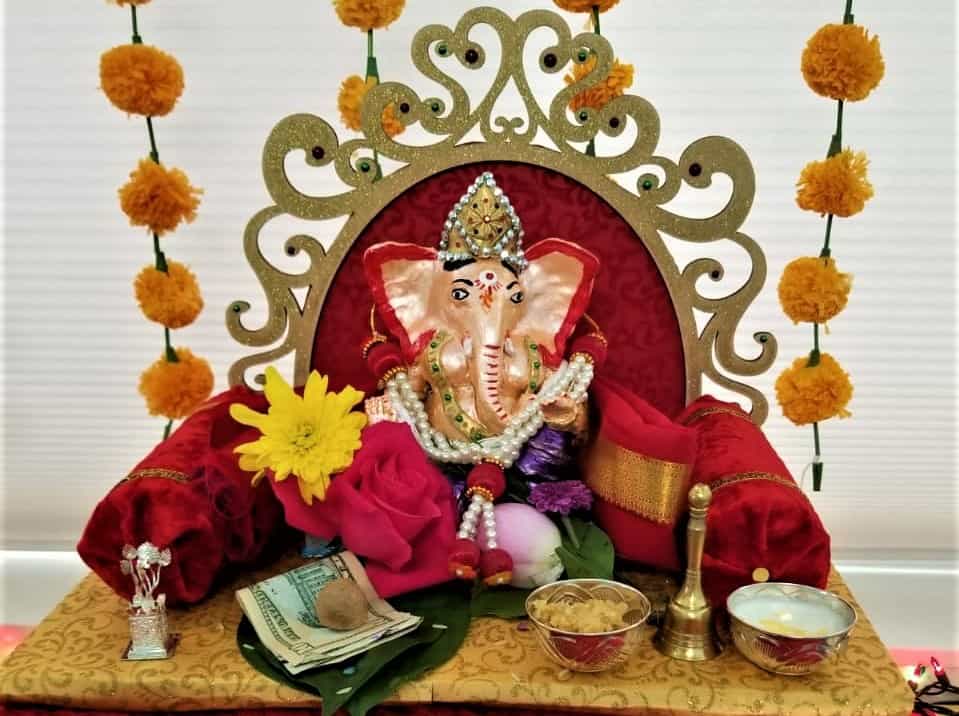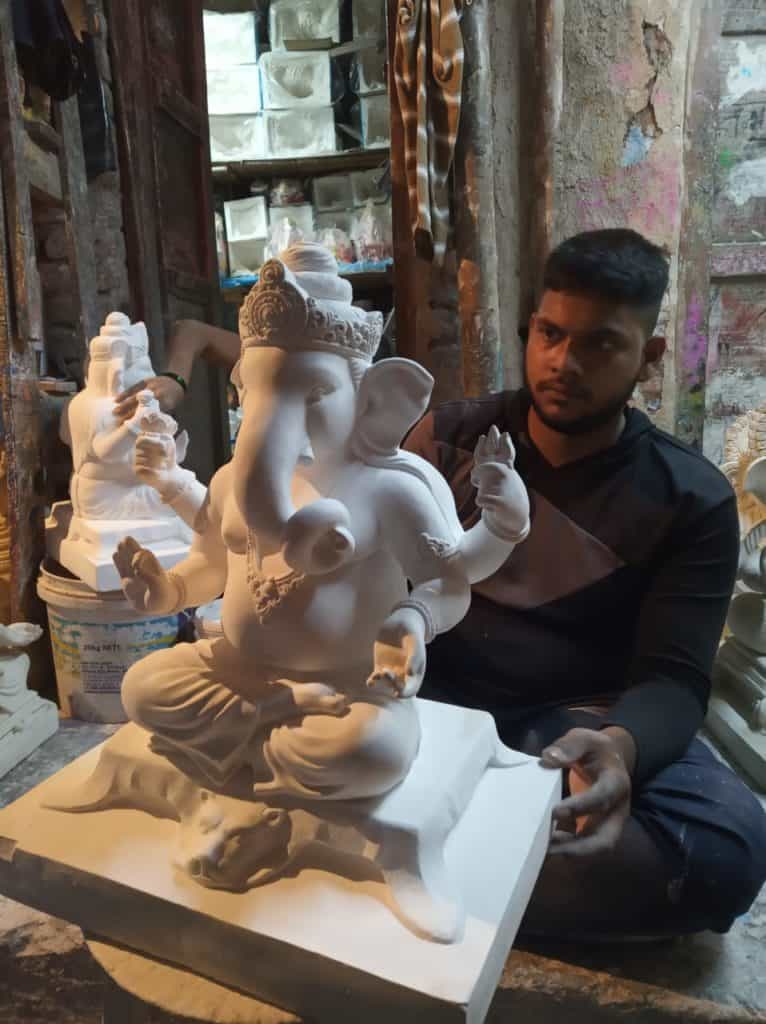Even the remover of all obstacles, Lord Ganesha, has not been able to come to the aid of the makers of his idols this year. As Ganesh Chaturthi approaches, traditional Ganesha idol makers like Sanket Kumbhar, Dheeresh Naik, Haresh Mhatre, can only hope that the Lord will make the coming weeks less harsh. Looks unlikely though, especially as the government has restricted all public gatherings and festivities that the city’s various Ganesh mandals, their main customers, would normally organise.
The numbers tell the story. “In the years gone by, all my family members would come together and make about 3,000-3500 idols,” said Sanket Kumbhar, who has his workshop in Navi Peth, near Poona Hospital. “This year we could make only about 1000 idols.”
Sanket speaks of how this year has been difficult, right from the beginning, from March-April, which is when they usually begin to receive orders and bookings. The schedule went for a toss this time and the extended lockdown only made things worse.
Dattadri Kothur, a senior art director with an advertisement agency in Mumbai, has a similar tale to narrate. Kothur and his team, work on the concept of Tree Ganesha (they stuff seeds of vegetables, flowers and tulsi in their clay or mud Ganesha idol, which after immersion and mixed into soil, sprouts into a plant). They had begun work on these idols as usual in January and February. But then the pandemic hit, throwing life and business into disarray.
“We have been supplying 1,200 Tree Ganesha idols for four years now,” said Kothur. “This year the number has come down to 500. We had to stop all work between March and May. The fear was such that we thought we won’t be celebrating Ganesh Chaturthi this year. There were no bookings, no enquiries. Everyone was worried about their survival.”

New directives
Kothur and his team started getting enquiries and were able to start making their Tree Ganeshas only from mid-June, after CM Uddhav Thackeray issued directives for celebrating the festival.
“Our idols should have been ready by now,” added Kothur. “The idols will take another week to dry, before they are painted and packed and transported to Pune, Ahmedabad and of course, our customers in Mumbai.”
The State Government’s cap on the height of the idols and restricting immersion also took the idol makers by surprise. The directives said that families should opt for metal idols in their homes. Or eco-friendly idols of two feet which can be immersed in a bucket of water. The Sarvajanik mandals can install idols of maximum four feet.

“We make both the gharguti (idols which are installed in homes) and Sarvajanik (public celebrations undertaken by Ganesh mandals) murtis, so some of our idols are tall,” said Sanket Kumbhar. “We are hoping that some Ganesh mandals will buy these murtis or we will have to keep them for next year, assuming life goes back to old normal”.
Some villages still in lockdown
In the old normal world, wholesalers would have set up the stalls by now and also made part or full payment to idol-makers like Kumbhar and Akash Chandekar.
But not this year. “This year, the situation is such that no one has money, so even if we ask for payment from the wholesalers, we are not sure if they can pay,” says Kumbhar.
Chandekar, a student whose family runs idol making units, echoes Kumbhar’s sentiments. “The Ganesh Chaturthi festival is barely a month away and in normal circumstances, the wholesalers would have selected their idols by now,” said Chandekar. “That would have given time for their regular buyers to book and bring the lord to their home. Where’s the time now?”

Chandekar also lists other problems idol makers are facing this season. Like the special kind of mud required in making eco-friendly idols. “Our mud comes from Rajasthan”, explains Chandekar. “We had some mud in stock when we started making Ganesh idols. But in May, we ran out. It was only after lockdown restrictions were eased a bit that we could get a fresh supply”.
In recent years, environmentalists have waged a campaign to promote the use of eco-friendly, or Shaadu maati murtis, which do not pollute water bodies. Traditionally, the Shaadu maati idols come from Pen in Raigad district and are known for their fine and delicate craftsmanship.
“I usually make 450-500 Ganapatis every year but this time could only make 150 because of lockdown and social distancing requirements,” said Haresh Mhatre, who has been making such idols for 30 years now. Haresh works in a very small space so it was difficult for all his workers to work together, while keeping safe distance.
Out of these 150 idols Mhatre made, 40 were damaged during the Cyclone Nisarg that hit Raigad district in June. “I had kept the idols in a shed because we were warned about the cyclone,” said Mhatre, who hails from Jua village near Pen. “But the tin roof of the shed flew off in the strong winds and 40 idols got wet in the heavy rains that followed.”
Mhatre’s troubles do not end there. Lockdown continues to be enforced in some villages on the discretion of the local bodies and this affects transportation of the idols. “I have informed my customers that they won’t be able to enter my village,” said Mhatre. “They will have to park their vehicles on the road and my family members will get them their idols”.
Kothur too faced labour and supply problems. “We get our mud from Dharavi which was a COVID hotspot in Mumbai. Keeping in mind the safety of our team, we could order fresh supplies only after the situation improved in Dharavi.”
Cost of being eco-friendly
The campaign to make eco friendly idols compulsory also pushed up the cost of idols. “One eco-friendly idol will cost you Rs 6000, while the same piece in PoP will cost Rs 3000,” said Dheeresh Naik, an artist from Nerul, Navi Mumbai. “Also, the eco-friendly idols are delicate and fragile.”
This year just 20 of Dheeresh’s customers have requested for Shaadu maati idols. He made 80 such murtis, whereas in past years, he has made up to 300 PoP idols. “We are also asking our customers to come on specific days to collect the Ganapati idols, so that there is no rush on one particular day,” Dheeresh said.
Overall it is a good thing, less pollution. Difficult to see how these painted idols will not pollute.